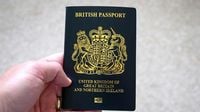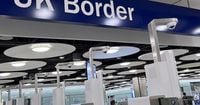Starting April 2, 2025, all European visitors to the United Kingdom must obtain an Electronic Travel Authorisation (ETA) before entering the country, a significant step in the UK's ongoing efforts to enhance immigration security. This new requirement follows the earlier implementation of the ETA for travelers from the United States, Canada, and Australia, which began on January 8, 2025. The move aims to streamline entry processes while ensuring thorough screening of visitors.
The ETA, which costs £10 (€12) until April 9, 2025, when it will rise to £16 (€19), allows visitors to stay in the UK for up to six months and is valid for two years. The application process is designed to be straightforward, taking approximately ten minutes to complete online or via a mobile app. Applicants will need to provide personal details, a photo of their passport, and answer suitability questions regarding their criminal history.
Phil Douglas, head of the UK Border Force, emphasized that the ETA system is part of a broader strategy to improve border security through technology and innovation. He stated, "This scheme is essentially a border security measure," and added that he does not anticipate disruptions from the rollout. Once approved, the ETA will be digitally linked to the applicant's passport, allowing for quicker passage through border control, particularly at eGates.
Despite the apparent simplicity of the application process, confusion has emerged, particularly among British dual nationals. While theoretically, these individuals do not need an ETA and can travel on whichever passport they choose, many are uncertain about the requirements if they do not possess a valid British passport. Issues have been raised regarding the application form, which does not include an option for selecting 'British citizen' when declaring other nationalities.
When asked about this discrepancy, an ETA advisor from the Home Office was unable to provide clear guidance. They indicated that dual citizens holding British or Irish citizenship do not require an ETA, but emphasized the need to present a valid passport or a certificate of entitlement to the right of abode in the UK. For those lacking these documents, the only options are to renew their British passport, which costs £101 (€123), or to apply for a certificate of entitlement, priced at £550 (€658). Both processes can take several weeks, leaving many travelers in a bind.
As of now, the ETA system applies to nationals of around 30 European countries, excluding Irish citizens. It is designed to facilitate travel while ensuring that the UK can effectively screen visitors. The Home Office reported that nearly 1.1 million ETAs were issued before the end of 2024, highlighting the growing importance of this travel authorization.
Travelers are advised to apply for their ETA at least three working days before their trip, although many applications are processed almost instantly. The government has acknowledged that some passengers, particularly children and infants, will also need to secure an ETA, even though transit passengers who do not cross the UK border will be exempt from this requirement.
The introduction of the ETA aligns with the UK's post-Brexit immigration strategy, which aims to bolster security and manage the flow of visitors more effectively. With the UK having received 22.5 million visitors from the EU in 2023, an increase from 19 million in 2022, the government is keen to ensure that its borders remain secure while still welcoming tourists.
The ETA mirrors the European Travel Information and Authorisation System (ETIAS), which is set to be implemented for EU countries in 2026. This synchronization reflects a broader trend in global travel regulations, where countries are increasingly requiring pre-travel authorizations to enhance security and streamline entry processes.
As the UK continues to navigate the complexities of post-Brexit travel, the ETA represents a crucial development in the landscape of international travel. With its launch, travelers from Europe will need to adapt to these new requirements, ensuring they have the necessary authorizations in place before embarking on their journeys to the UK.
In conclusion, the rollout of the ETA system signifies a pivotal shift in how the UK manages its borders, balancing the need for security with the desire to facilitate travel. As travelers adjust to these new norms, clarity and communication from the government will be essential in preventing confusion and ensuring a smooth transition to this new system.





